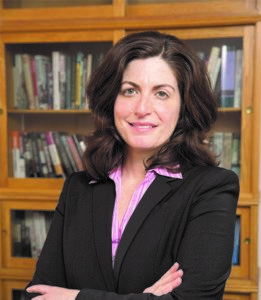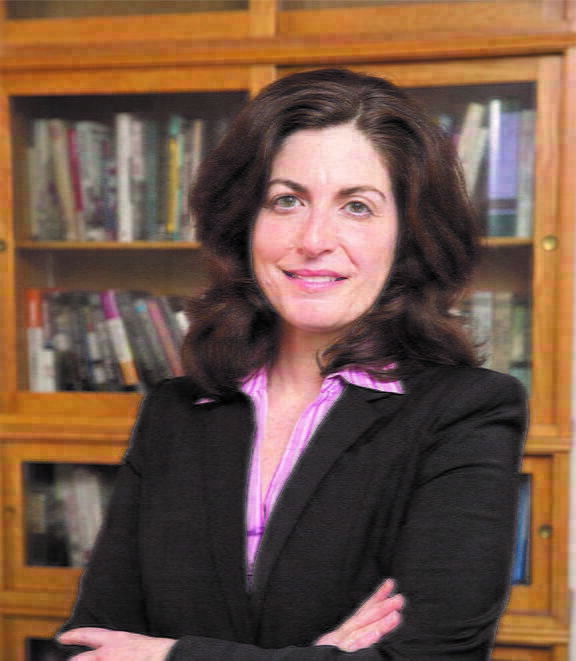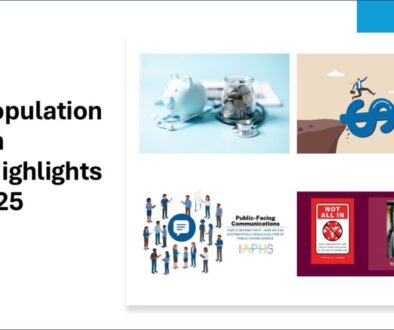Finding Success and Staying Sane as an Interdisciplinary Scientist
Cynthia ColenWe talked with Cynthia Colen, Associate Professor, Ohio State University Department of Sociology , about her career journey, how she found her way, and how she navigates life in the interdisciplinary lane. She also offers advice to new scholars.
How did you know you wanted to be a professor of sociology?
The truth is that I didn’t! What I did know, however, is what issues I was passionate about and what skills I was good at.
What do you think helped you get here?

First, I have been lucky to have excellent mentors who have carefully guided me while giving me enough freedom
to shape my own ideas. Second, I am stubborn. Not your garden variety version of stubborn. I never give up, on anything.
I did not major in a health-related field as an undergraduate. Instead, I pursued a dual concentration in women’s studies and Latin. It was as a women’s studies major that I was introduced to interdisciplinary thinking and research. I learned through the courses I took how social, economic, and political conditions worked in tandem to shape people’s experiences.
I understand some personal experiences helped shape your work. Can you describe those?
My mother was diagnosed with Stage 4 ovarian cancer when I was 13. Although I did not know it at the time, she was given only six months to live. She went on to live another five and a half years, wildly exceeding even the most optimistic prognoses. She did this by fighting back. I would come home from school and find her on the phone yelling at some unsuspecting soul at the local or state health department that, based on the back of the envelope calculations she had done, there appeared to be a cancer cluster in our neighborhood and she wanted some answers!
My mother was not a scientist or a researcher; she was not even a college graduate. But she knew something was not right when too many people in our neighborhood were being diagnosed with cancer. I realize now that this was my introduction to the social determinants of health. I began to understand that disease was not simply the result of personal choices or behaviors, but very much shaped by the social conditions in which one lived, worked, and otherwise spent time.
After completing my undergraduate degree and working in the “real world” for five years, I decided to pursue training in public health. I was lucky to land at the University of Michigan at just the right time when there were several big names in the field there: Arline Geronimus (who became my mentor, and an amazing one at that), Sherman James, David Williams, George Kaplan, and Jim House – all of whom shaped my thinking regarding how social conditions influenced disease processes.
I became an NIH trainee at the Population Studies Center, even though I did not understand what a demographer really did. There I became adept at making theoretical and substantive connections across disciplinary boundaries and learned to use disciplinary jargon to translate similar concepts from one field to another.
As a RWJF Health & Society Scholar, I received intensive mentorship from our site directors and affiliated faculty but also had the opportunity to foster professional relationships across the six different sites. For me, the best thing about the HSS program was the cadre of fellow postdocs with which I formed close relationships. These people now serve as my collaborators, sounding board, and key members of a support system that has helped me navigate my professional journey so thus far.

At the end of my postdoc program, I was contemplating whether to go on the public health or sociology job market. Honestly, I didn’t fit into either category. My research was more like that of a traditional demographer and my Ph.D. was in public health. I didn’t realize, however, that my identity as an interdisciplinary scholar would collide, headlong, into entrenched departmental expectations about how to measure professional success.
In many sociology departments, success means publishing sole-authored papers in top-tier, mainstream sociology journals. However, this did not accurately capture my research. I almost always worked with teams of other researchers and tend to publish in interdisciplinary journals. My work also drew widely on research from sociology, demography, epidemiology, public policy, psychology, and medicine rather than maintaining a single disciplinary focus. Because of these differences, I found myself doing a lot of “translation” to help to put my work in a more accurate context.
How does IAPHS help you and your work?
IAPHS allows me to continue to keep my pulse on the dynamic, broad based field of population health; keep existing collaborations moving in productive directions; and establish new relationships with investigators of all levels. I am most excited about the empirical endeavors I see junior folks tackling right now. I am continually awed by the range of thoughtful research questions and innovative methodologies that graduate students, postdocs, and assistant professors are using to further expand the interdisciplinary perspective of population health science.
Tell us more about how your current work today.

Today, I am trying to pursue research projects that have more direct policy implications as well as be more publicly engaged about my work. I am also continuing to bring interdisciplinary approaches to studying the social determinants of health into more mainstream, disciplinary environments.
As I branch out into new areas of inquiry, I still pursue research topics that are central to studying health disparities from a decidedly sociological perspective. In particular, I focus on the experiences of middle-class African Americans and ask why, despite having better than average social standing, their health outcomes remain substantially worse than similarly situated Whites.
My interdisciplinary exposures enable me to ask slightly different questions or interpret findings in new and novel ways rather than tackling a completely different research agenda. For example, a current project investigates the long-term effects of early childhood lead exposure on adolescent and young adult risk-taking behaviors, particularly among racial/ethnic minority groups. The underlying research question driving this work would never have taken hold without interactions with criminologists, environmental scientists, and developmental psychologists.
Tell us more about how you see the population health scene today.
The landscape has changed. The phrase social determinants of health is now frequently used by clinicians and politicians. Furthermore, there are now many more up-and-coming scholars producing high-quality interdisciplinary research, so this concept is rapidly becoming normalized and integrated into the larger academic environment. I currently coordinate an undergraduate degree program in Public Health/Sociology so that students are introduced to these topics earlier in their academic training. I still often find myself to be “the odd woman out” but, honestly, I like it that way.
Finally, our readers would love your advice.
Here are my tips for maintaining your sanity as an interdisciplinary health scholar.
- Trust your gut.
- Don’t be afraid to ask questions and push back against how things “have always been done.”
- Read widely. And then read even more widely.
- Get out of your comfort zone. If this doesn’t come naturally to you, practice it in other areas of your life.
- Don’t be afraid to take chances or make mistakes.
- Make sure you understand fully expectations for promotion and tenure in the field in which you land.
- Establish professional relationships with individuals from a wide range of disciplines as well as jobs.
- Learn early on how to engage the media so that you can translate your research to a wider audience.
- Work on developing a clear and concise writing style that does not rely too heavily on disciplinary jargon.
- Rely on existing interdisciplinary programs and organizations for networking and support





All comments will be reviewed and posted if substantive and of general interest to IAPHS readers.